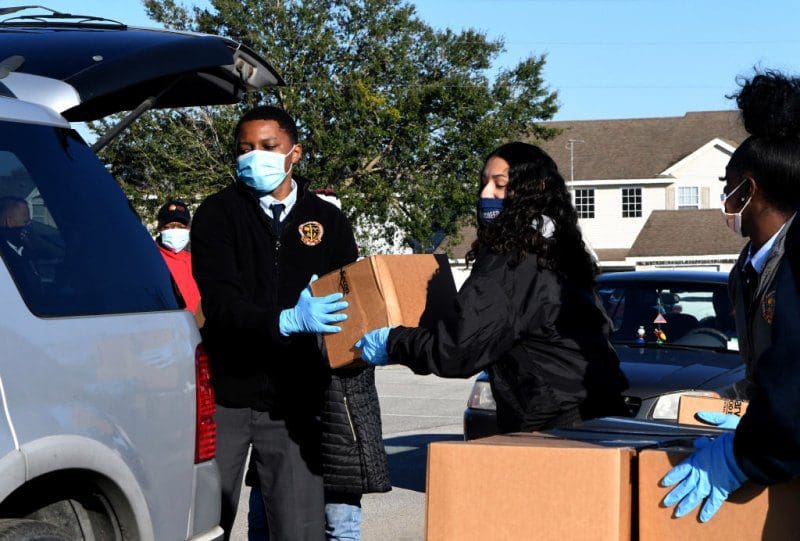Giving people money is a proven, fast, equitable strategy to spur economic recovery. The truth is, we need recurring stimulus checks in addition to established progressive policies.
Opinion by Natalie Foster
The hole America faces is deep and getting deeper every day as COVID-19 cases mount and the economy struggles to restart. Which is why Washington must think bigger for the recovery package. The biggest danger right now is doing too little, rather than too much. President Biden’s leadership on bold relief comes at a crucial time.
The idea of $2,000 stimulus checks has exploded in popularity over the past few months. Georgia Senators Jon Ossoff and Rev. Raphael Warnock ran, and won, in large part on checks. President Joe Biden committed to introducing legislation for additional direct payments to families.
While a one-time stimulus check is critical to help people in the midst of the pandemic, for a real and sustainable recovery, we’ll need recurring checks until the crisis is over.
Giving people money is a proven, fast, equitable strategy to spur economic recovery. The truth is, we need recurring stimulus checks in addition to established progressive policies—like unemployment insurance and the Child Tax Credit and Earned Income Tax Credit—that uplift all Americans, especially communities of color, until this pandemic is over.
The jobs crisis is severe and worsening: According to recent data, US employers cut 140,000 jobs in December. All were held by women, while men gained employment. On top of that, women ended 2020 with 5.4 million fewer jobs than they had in February, before the pandemic began, while men lost 4.4 million jobs over that same time period.
And beneath this gender disparity was another problematic difference in job loss; Black and Latinx workers lost more jobs in December than their white counterparts. That’s a major blow, considering that Black and Latinx households are twice as likely to have difficulty paying their bills. They also face higher levels of food insecurity, COVID-19-related mortality, and business closures than their white counterparts.
Families experiencing economic hardship need relief that is both fast—the IRS can get money into most Americans’ bank accounts in a matter of days—and sustained. Bills keep coming, and the checks need to keep coming too: Data suggests the CARES Act checks ran out for many families after a couple of months. The programs we already have are essential to expand but we need to do more — and faster. Expanding unemployment insurance essential, lifesaving for workers who get it, but it’s not reaching most of the people who have lost income. Urban Institute estimates that regular checks could keep 3.5x more people out of poverty than unemployment insurance alone. In other words, while these essential programs complement direct checks, they are not alternatives.
Alongside unemployment insurance, a relief proposal at the scale of the crisis should include the promised $2,000 check, followed by additional checks of $1,000 or more, monthly or at least quarterly, until employment approaches pre-pandemic levels. We can target this relief to families who need it and will spend it – to help those who are struggling and drive the recovery.
The Urban Institute research shows that just one more $1,200 stimulus check could keep 8 million Americans out of poverty, while two more checks could save 14 million from falling into poverty.
Imagine what monthly checks could do for struggling American families. Direct checks targeted to the bottom income earning half of households would also ensure those same families aren’t left behind, and would disproportionately benefit Black and Brown families hit hardest.
If relief is big enough, Brookings analysis confirms, direct payments would have a greater impact on our GDP in the immediate term than many other major policies under consideration.
We’ve learned this lesson before. The Obama-era 2009 Recovery Act was too small, and a decade later many Americans still struggled. Many economists agree that the Recovery Act fell short of delivering a speedy recovery and the decisive political win that would have come with it, because it wasn’t sustained enough or visible enough to everyday Americans (and thus was often viewed as a corporate bailout).
President Biden appears to understand: we must avoid that mistake this time and “failure to do so will cost us dearly.” Checks make government support visible to Americans. We must not underestimate the power of putting money in people’s pockets at a time when so many are barely scraping by.
The economic conditions facing most Americans are getting worse, not better. We should target checks to those who need help most and who will spend it to spur the economic recovery. But a one-time check will only last people a couple of months, at most. To truly build back better, we need recurring payments until the crisis is over. People who are going without food, medicines and electricity cannot afford to be held hostage to political games in Washington. They need steady and regular relief, and it is the duty of our president and Congress to provide it to them. It’s good economics and the moral thing to do.
_____
Foster is the co-founder and co-chair of the Economic Security Project, an organization focused on cash-based policies, guaranteed income and curbing corporate power.
To see original article please visit: https://time.com/5933102/stimulus-checks-pandemic-over/




















